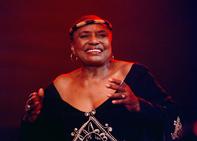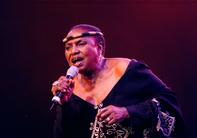Empress of African Song
Affectionately known as ‘Mama Africa’, the late Miriam Makeba is one of South Africa’s most famous and well-loved musicians. She became the fearless and unwavering voice of the African continent during the apartheid years, and expertly portrayed the struggle of the black musician in South Africa, with grace, love and soulful melodies. Her legacy continues to be celebrated, as she touched the hearts of many South Africans throughout her illustrious career.

Miriam "Zenzi" Makeba was born in a Johannesburg township in 1932. She grew up with the notion that music was a magical escape from the harsh reality of poverty. She was a young singer at the Methodist Training school in Pretoria and was mentored by the iconic Dolly Rathebe.
At the age of 17, Makebe gave birth to her daughter, her only child, in 1950. In just a few short years later, Makeba’s music career kicked off when in 1954 she joined the American jazz-influenced group, the Manhattan Brothers. At the time, South African jazz was heavily inspired by Western jazz and ragtime but was mixed with a distinctive vocal harmonic style known as mbube. When the group toured overseas, Makeba joined a female group called the Sunbeams, who later became known as the Skylarks. They recorded numerous hits and became famous in the local Joburg jazz scene. Eventually, Makeba joined the Manhattan Brothers on tour, travelling through Africa for a few months.
In 1975, Makeba was recruited by the African Jazz and Variety Review, with whom she performed as a soloist. She then landed the lead role in the legendary South African musical, King Kong, which was performed around the country and exposed Makeba to the liberal white community.
Makeba found international success with a small singing part in the film, Come Back Africa, where she played herself and performed two songs. The director of the film, Lionel Rogosin, invited her to attend a screening at the 1959 Venice film festival, where she became an instant celebrity. She then played at the Village Vanguard jazz club in New York - she was a star on the rise.
American Star
Her first solo recordings were governed by American singer, Harry Belafonte, who nurtured Makeba’s energetic and vibrant sound. Iconic songs such as Pata Pata and the Click Song formed the basis of her repertoire and remained the most popular songs throughout her career. While overseas, Makeba’s passport was revoked and she was forced to go into exile.
Her time in America saw Makeba reach a new level of stardom - she was a young, foreign newcomer with a bubbly personality and a dynamic voice, appearing with the likes of Marlon Brando, Bing Crosby and even Marilyn Monroe!
In 1962, Makeba visited Kenya, which saw her become part of the UN, speaking out against the apartheid system and its opressive regulations. After two marriages, Makeba married fellow legendary South African jazz musician, Hugh Masekela in 1964. She continued to perform throughout Africa, and in 1966 she earned a Grammy award with Harry Belafonte.
Politically Active
Makeba became deeply involved in the Black Consciousness movement in America during the late 1960s and continued to speak out against apartheid. Her fourth marriage in 1968 was to Stokely Carmichael, a leader of the Black Panther Party. As a result, the American government became increasingly hostile to them and the couple moved to Guinea.
Makeba’s music became more politically influenced with the 1977 song "Soweto Blues", written by her former husband, Hugh Masekela, was about the Soweto uprising. Her strong vocals and emotive lyrics strengthened her stance against the brutality of the South African government and although she lost support from followers, she never folded in the face of adversity.
Makeba Legacy

When the apartheid system was dismantled in the 1990s, Makeba returned to South Africa. Her career continued to blossom - she recorded and performed with Nina Simone and Dizzy Gillespie in 1991, and was cast in the film Sarafina! In 1992 alongside Whoopi Goldberg. She became a UN goodwill ambassador in 1999 and started campaigning for humanitarian causes.
In 2008, Makeba died from a heart attack at a concert in Italy. Both her international and local fans paid tribute to her legacy, with former South African President Nelson Mandela stating "her music inspired a powerful sense of hope in all of us."
The Makeba legacy is one of note - she brought African music to a Western audience and popularized various African music genres, while simultaneously staying true to her roots and fighting for freedom in her home country.